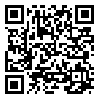BibTeX | RIS | EndNote | Medlars | ProCite | Reference Manager | RefWorks
Send citation to:
URL: http://ijpcp.iums.ac.ir/article-1-1709-en.html
Williams, Watts, Macleod and Mathews' (1988) model of anxiety and depression leads to the prediction that anxious patients will show mood – congreuent implicit memory bias, while depressed patients will show mood-congruent explicit memory bias.
Although this prediction has been supported by some researchers (Denny & Hunt, 1992 mathews, Moog, et al , 1989 watkins, et al, 1992), the reliability or generality of their findings remain to be confirmed.
In the present study, implicit and explicit memories of two groups of patients with generalized anxiety disorder and dysthymic disorder as well as a group of normal individuals were mesured by recognition (explicit memory) and tachistoscopic word identification (implicit memory) tasks. As predicted, patients with dysthymic disorder showed mood-congruent explicit, but not implicit memory bias. However, patients with generalized anxiety disorder did not show significant mood-congruent memory bias in either implicit or explicit memory tasks.
The results of this study support Williams et al.'s model of depression and cognition. But they do not provide support for mood – congruentnt implicit and explicit memory bias in individuals with anxiety disorder.
Received: 2012/12/11 | Published: 1998/05/15
| Rights and permissions | |
 |
This work is licensed under a Creative Commons Attribution-NonCommercial 4.0 International License. |



